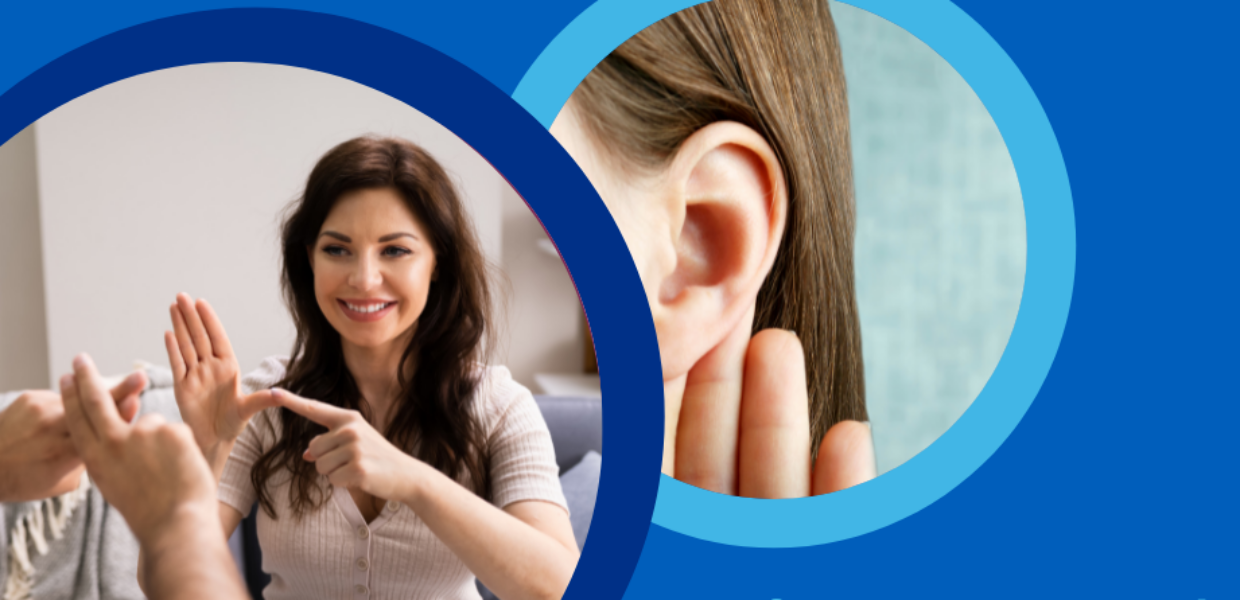It’s Deaf Awareness Week and we want to talk to you about hearing loss.
Did you know, one in five UK adults is directly affected by deafness, hearing loss or tinnitus – all of which can make effective communication a challenge and can lead to frustration and loneliness.
For those who rely on facial expressions and lipreading to communicate, the last two years have been especially difficult – as less interactions have been face-to-face and, where they have, people have been wearing masks to help prevent the spread of Covid-19.
We want to help to change that, so we’ve put together some information about:
- How we can support you if you’re deaf or have hearing loss and you need general hospital treatment
- Our specialist Audiology services available if you’re deaf or suffer hearing loss
- How to spot the signs of hearing loss
- Some hints and tips to help you communicate more effectively with anyone who has hearing loss.
How we can support you if you’re deaf or have hearing loss and you need general hospital treatment
When you’re coming into hospital for treatment, we know how important it is for you to know that our clinicians have understood exactly how you’re feeling and what the issue is – and for you to fully understand their advice, diagnosis, and treatment plan.
And, if you’re deaf or hard of hearing, there are additional measures we can put in place to assist.
For example, did you know that if British Sign Language is your first or preferred language, we can use the Video Relay Service to assist you during appointments and consultations?
Our teams also have access to a supply of clear face masks to assist you if you lip read and are encouraged to use live text to speech apps to aid communication.
Please let us know if you would like to make use of any of these services.
Our specialist Audiology services available if you’re deaf or suffer hearing loss
Our expert team are here for you if you have ear, hearing or balance difficulties.
They can provide diagnostic assessment and treatment; support and fitting of devices such as hearing aids; and either help you to restore or learn communication skills.
The team also work closely with our Family Services teams, supporting them in offering all new parents the opportunity to have their child’s hearing tested shortly after birth.
They also works directly with babies and children referred from our neonatal intensive care unit or by community-based health visitors, to further investigate any concerns and help to develop the child’s communication skills where needed.
There’s lots of additional information available on our dedicated Audiology page, including videos, guided meditation for helping to cope with tinnitus and contact details for the team.
How to spot the signs of hearing loss
Unaddressed, hearing loss can have a serious impact on your wellbeing, mental and physical health, including depression and dementia, so if you’re concerned it’s best to find out what’s going on as soon as possible.
If you can relate to any of the points listed below, the best thing to do is to have a hearing test.
Do you:
- turn the TV up louder than your family wants it
- find it hard to follow conversation in pubs and restaurants
- struggle to hear on the phone
- often ask people to repeat what they say
- find your partner complain that you don’t listen to them
- feel that other people mumble.
A free check is available through the Royal National Institute for Deaf People – though this is not as effective as a hearing test with an audiologist.
If you’re worried, please speak to your GP and they will be able to refer you to our Audiology team, who offer a full hearing assessment and fit high quality, digital hearing aids free of charge.
The team can also provide advice on Tinnitus – which manifests as a ringing or whistling sound in your head and ears.
Hints and tips to help you communicate more effectively with anyone who has hearing loss
The most important thing to remember is that there’s no single approach that will suit everyone – and the easiest way to find out what works best for someone is to ask them.
However, you may also find the following tips useful:
Face to face:
- Make sure you’re facing the person you’re speaking to and speak clearly. Avoid shouting, speaking too fast or unnecessarily slow.
- If someone doesn’t understand you, repeat what you said. Alternatively, can you phrase it differently using plain language.
- If you’re somewhere noisy, move to a quieter area where possible or cut out background noise.
- Use simple gestures such as pointing or waving to get someone’s attention
- Write things down – this could be everything from pen and paper to a whiteboard or typing text into a device screen
On a video call
- Have your camera on!
- Make sure you’re in a well-lit area. Don’t have the light source behind you, as this can put your face in shadow and make it harder to for someone to lipread
- Face the camera and don’t cover your mouth while you’re speaking
- Don’t all talk at once. By ensuring only one person speaks at a time, it’s easier for someone to follow the conversation. It can also help to make captions more accurate if someone is using this facility.
- Mute when you’re not talking to reduce background noise
- Use chat functions to clarify details – especially with numbers
- Use (and stick to) an agenda, so there is context to what is being discussed.
For more comprehensive help and advice, check out the RNID website.
